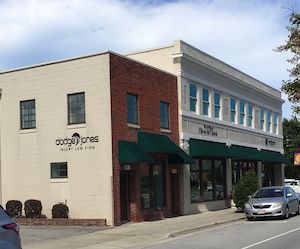Does Workers' Comp Cover Travel to and From Work?
 The NC Workers’ Compensation Act is purposely expansive in nature.
The NC Workers’ Compensation Act is purposely expansive in nature.
The law is drafted to cover employees who are injured on the job, understanding there are as many different job responsibilities as there are jobs and employers.
What happens though if the employee isn’t physically on the premises of the employer?
What does “during the course and scope of employment” mean, relative to making a claim for such injuries?
An Example of the Coming and Going Rule in North CarolinaCertain jobs require travel between the office and client job sites.
The “going and coming rule” in North Carolina generally operates to exclude coverage under the NC Workman's Compensation laws.
Injuries and the resulting damages, even if disfiguring or permanent, are disallowed if the employee is hurt traveling to and/or from the place of employment.
There are exceptions to such “rules,” including if the Employer provides transportation incident to the “contract of employment.”
Another exception to the “going and coming” defense that protects the Employer (and their insurance carrier if there is coverage) from legal liability may result if and when an employee is injured while on the premises of the employer.
Scope of EmploymentFor example, an employee of a NC security company visits business locations, factories, and other industrial facilities to review security needs and provide an estimate for upgraded security systems.
Prior to visiting job site, the employee often goes to the office, checks in, and picks up a camera to take pictures.
That is not required. The employee also regularly goes to the job site first. A lot depends on how long he is on site, where he has traveled, and meeting times set by potential clients.
How Much is My Case Worth?Put simply, we works around the clients’ schedule and availability to meet.
That, therefore, requires flexibility in his schedule and when he “checks in” by swinging by the office.
The employer provides a company-owned vehicle that is “wrapped” with company logos, a telephone number, and a graphic stating, “You and your security are what we do. We come to you.”
The employee uses the vehicle to travel to job sites and back-and-forth to the office.
He also take the vehicle home at night as he is “on call” 24/7.
At the end of work one day the employee is involved in a terrible car accident.
A drunk driver runs a red light and crashes into the Employee’s company vehicle.
The employee is killed in the accident.
The family opens an estate, filing claims under the NC Workers’ Compensation Act.
The Estate also sues, on behalf of the decedent and the family, claims for negligence, gross negligence, and wrongful death against the drunk driver.
Should I Hire a Lawyer? The employer denies the claim for Workers Comp, arguing the Coming and Going Rule Applies.
The employer denies the claim for Workers Comp, arguing the Coming and Going Rule Applies.
The Estate of the employee argues the Contractual Duty Exception supersedes the defense.
The Coming and Going Rule sets forth that a workplace injury is not covered under the Work Comp Act in NC if not in the course of employment.
Accidents that take place during travel to work and from work are not generally covered and therefore not compensable.
If an employer provides transportation (or a company vehicle) incident to the contract of employment, the claims may be covered (compensable).
Will I Lose My Job?Transportation (the company vehicle in this example) must be provided by the employer “as a matter of right.”
If the transportation provided is a “mere accommodation” or permissive or gratuitous, that is not deemed within the “course of employment.”
Am I Covered?Given the consequences that necessarily include no coverage or legal responsibility for an accident, the specifics of case are important.
- Was the employee acting within the course and scope of employment?
- Was the vehicle provided a “mere accommodation?”
- Is travel offered/provided on a “permissive” basis?
- Is provision of travel by the employer “gratuitous?”
- What was the purpose of the travel?
- How are other employees treated?
- Is the employee required to use a company vehicle?
- May the employee use the vehicle for personal travel?
- Does the employer have a company policy?
- Is the policy written? Is there an oral contract?
- Is there a written contract indicating the purposes and uses of vehicles and/or travel?
“Coverage issues can be incredibly complex, particularly in the context of defenses to coverage and denial of liability – Kevin Jones, NC Worker Comp Lawyer.
Call NOW to schedule your free consultation or email Kevin@DodgeJones.com
 Dodge Jones Injury Law Firm Home
Dodge Jones Injury Law Firm Home








